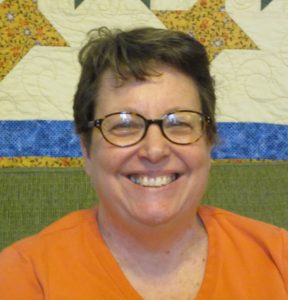 June Mears Driedger is co-director of The Hermitage (www.hermitagecommunity.org), a contemplative retreat center, offering spiritual direction and retreats in Three Rivers, Michigan. She is a member of the Mennonite Spiritual Directors Network and serves on the steering committee.
June Mears Driedger is co-director of The Hermitage (www.hermitagecommunity.org), a contemplative retreat center, offering spiritual direction and retreats in Three Rivers, Michigan. She is a member of the Mennonite Spiritual Directors Network and serves on the steering committee.
_______________
Sarah pauses in mid-sentence and looks out the window of my office. She appeared agitated when she arrived for spiritual direction, and she was quickly sharing her thoughts and feelings about a particular decision.
As I wait, I pray for her — and for me, for the Spirit to nudge me toward a particular question. Rather than a question, I sense that silence is the wisest response. I sit in silence, waiting for Sarah to speak again.
Silence isn’t my natural response.
I am very curious about people, and I am known to ask many questions and, then, ask follow-up questions. This penchant for asking questions is fine with family and friends, but chatty questions are distracting within spiritual direction. I have to discipline myself against slipping into chit-chat with directees, as chatting can hinder the movement of the Spirit. When I make room for silence and surrender to the Spirit, I experience God’s presence in both the directee and myself. When the silence unsettles me, I begin to chatter — cluttering up the space with the needs of my own ego. For me, resisting silence means resisting the Spirit, as silence challenges my ego from making assumptions about God’s purpose for the directee.
In his book, The Way of the Heart, Henri Nouwen suggests that my compulsion to chatter is actually due to my doubt that God can actually stir the directee’s or my heart. He writes:
“Sometimes it seems that our many words are more an expression of our doubt than of our faith. It is as if we are not sure that God’s Spirit can touch the hearts of people: we have to help [God] out and, with many words, convince others of [God’s] power.”
When we sit quietly together, the shared silence allows the directee and me, the director, to remain in the soul’s depth, further opening ourselves to God’s presence in the room.
Sarah and I remain in silence for several minutes. I note the flicker of emotions and thoughts on her face, but I stay silent while I hand her a tissue as a tear drops down her cheek.
She speaks again, telling me what she has discerned. Truthfully, I do not know exactly what occurred during that time of silence, but she encountered God. Nor do I need to know. I am — again — in awe of how God whispers and nudges in people’s lives. I wordlessly offer a prayer of gratitude for the Spirit’s presence for both of us that morning.
I study Sarah and she is more serene than when she arrived, an hour earlier.
“You seem more at peace,” I say.
“Yes, I feel more peaceful,” Sarah says. “Thank you for the silence — I really needed it.”
“I did too,” I say.
Learn more about the Mennonite Spiritual Directors Network at mennosdn.org.
The views and opinions expressed in this blog belong to the author and are not intended to represent the views of the MC USA Executive Board or staff.


